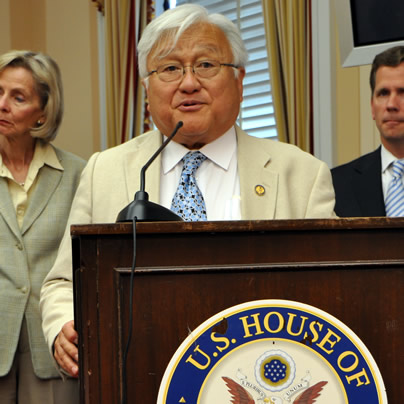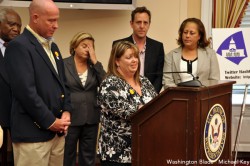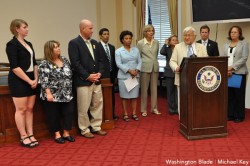National
Members of Congress launch anti-bullying caucus
Lawmakers pledge to pass legislation barring student harassment

A bipartisan group of House lawmakers led by Rep. Mike Honda (D-Calif.) launched on Thursday an anti-bullying caucus that aims to draw attention to LGBT youth and others who experience harassment.
During a news conference on Capitol Hill, Honda said lawmakers formed the Congressional Anti-Bullying Caucus, which he chairs, to carry the message against “the bullying epidemic” in schools, the workplace and assisted living facilities. Honda said stories about bullying are common among constituents of all lawmakers.
“This is going to be — from a national point of view right down to the local — a clarion call to make sure that all of us understand what this thing called bullying is,” Honda said.
Members of the caucus who spoke during the conference didn’t focus per se on the bullying of LGBT students in school — an issue that has received significant attention in recent years because of gay youths who have committed suicide after being harassed — although a few members of the caucus talked about incidents of anti-LGBT bullying in their districts.
Rep. Barbara Lee (D-Calif.) said transgender people in her district have experienced violence as a result of what she described as being bullied.
“Finally, let me just say in my own district in the last few months there have been three cases of transgendered individuals who were killed, who were killed, who were killed because of their identity, because they were bullied, and this is bad,” Lee said. “I want to make sure we all recognize that it is deadly.”
Legislation pending before Congress that aims to stop bullying against LGBT students is the Student Non-Discrimination Act, which would make LGBT status a protected class among students, and the Safe Schools Improvement Act, which would require schools to set up anti-bullying policies. In April, President Obama endorsed both pieces of legislation.
Rep. Lois Capps (D-Calif.), a former school nurse, talked about the story of Lawrence King, a gay student from California in her district, who died after being shot in 2008 by a classmate whom he asked to be his Valentine.
“His death and other similar tragedies remind us that bullying — particularly bullying directed at LGBT youth — must be stopped,” Capps said.
Capps said starting the anti-bullying caucus is “an important step,” but passage of the Safe Schools Improvement Act would be “the first thing we can do” to stop bullying.
Rep. Judy Chu (D-Calif.) said she has personal interest in stopping bullying because she has a nephew, Harry Lew, who killed himself about a year ago while serving in Afghanistan as a result of hazing.
“Two of his peers punched and kicked him, forced him to do push ups and crunches wearing his heavy full-body armor and poured the entire contents of a sandbag into his face and mouth,” Chu said. “This went on for three-and-a-half hours. Harry was serving his country and was the victim of harassment, and 20 minutes after the torment stopped, he climbed into a foxhole and killed himself. He was only 21 years old.”
As of Friday, 46 U.S. House members were among its members, including Reps. Pete Stark (D-Calif.), Rep. Keith Ellison (D-Minn.) and Del. Eleanor Holmes Norton (D-D.C.). Four Republicans are members: Reps. Ileana Ros-Lehtinen (R-Fla.), Charles Bass (R-N.H.), Robert Dold (R-Ill.) and Frank LoBiondo (R-N.J.). Following the news conference, Honda told the Washington Blade he expects more members to sign on, but didn’t disclose any names.
Ros-Lehtinen, who has a transgender son and is a co-sponsor of many pro-LGBT bills, was among the speakers at the news conference.
“We may be from different sides of the aisle, but we all believe that it is time to stand up and stop bullying — both offline and online,” Ros-Lehtinen said. “Every American deserves to live a life that is free from persecution and harassment. No one has the right to victimize others because of their gender, or their age, or their race, or creed, ethnicity or sexual orientation.”
Also present at the news conference was Lee Hirsh, director of the 2011 documentary film “Bully,” and David and Tina Long, the parents of a child, Tyler Long, who hung himself after being bullied and whose story was told during the movie.

Tina Long, mother of Tyler Long, who committed suicide after being bullied (Blade photo by Michael Key)
Long’s eyes filled with tears as she told her story.
“There is a problem and we’re going to take care of it,” Long said. “And if it takes federal legislation to make this happen, then that’s what we have to do. … We have this opportunity, and if we don’t take it, how many more parents are going to lose their children? You never want to have to bury your child for something that is preventable.”
Only one openly gay member of Congress is a member of the caucus: Rep. Jared Polis (D-Colo.). Reps. Barney Frank (D-Mass.) and Tammy Baldwin (D-Wis.) are set to leave the U.S. House at the end of this year. Scott Fay, chief of staff for Rep. David Cicilline (D-R.I.), said his boss will join the caucus at a later time.

The Comings & Goings column is about sharing the professional successes of our community. We want to recognize those landing new jobs, new clients for their business, joining boards of organizations and other achievements. Please share your successes with us at [email protected].
Congratulations to Gil Pontes III on his recent appointment to the Financial Advisory Board for the City of Wilton Manors, Fla. Upon being appointed he said, “I’m honored to join the Financial Advisory Board for the City of Wilton Manors at such an important moment for our community. In my role as Executive Director of the NextGen Chamber of Commerce, I spend much of my time focused on economic growth, fiscal sustainability, and the long-term competitiveness of emerging business leaders. I look forward to bringing that perspective to Wilton Manors — helping ensure responsible stewardship of public resources while supporting a vibrant, inclusive local economy.”
Pontes is a nonprofit executive with years of development, operations, budget, management, and strategic planning experience in 501(c)(3), 501(c)(4), and political organizations. Pontes is currently executive director of NextGen, Chamber of Commerce. NextGen Chamber’s mission is to “empower emerging business leaders by generating insights, encouraging engagement, and nurturing leadership development to shape the future economy.” Prior to that he served as managing director of The Nora Project, and director of development also at The Nora Project. He has held a number of other positions including Major Gifts Officer, Thundermist Health Center, and has worked in both real estate and banking including as Business Solutions Adviser, Ironwood Financial. For three years he was a Selectman, Town of Berkley, Mass. In that role, he managed HR and general governance for town government. There were 200+ staff and 6,500 constituents. He balanced a $20,000,000 budget annually, established an Economic Development Committee, and hired the first town administrator.
Pontes earned his bachelor’s degree in political science from the University of Massachusetts, Dartmouth.
Kansas
ACLU sues Kansas over law invalidating trans residents’ IDs
A new Kansas bill requires transgender residents to have their driver’s licenses reflect their sex assigned at birth, invalidating current licenses.

Transgender people across Kansas received letters in the mail on Wednesday demanding the immediate surrender of their driver’s licenses following passage of one of the harshest transgender bathroom bans in the nation. Now the American Civil Liberties Union is filing a lawsuit to block the ban and protect transgender residents from what advocates describe as “sweeping” and “punitive” consequences.
Independent journalist Erin Reed broke the story Wednesday after lawmakers approved House Substitute for Senate Bill 244. In her reporting, Reed included a photo of the letter sent to transgender Kansans, requiring them to obtain a driver’s license that reflects their sex assigned at birth rather than the gender with which they identify.
According to the reporting, transgender Kansans must surrender their driver’s licenses and that their current credentials — regardless of expiration date — will be considered invalid upon the law’s publication. The move effectively nullifies previously issued identification documents, creating immediate uncertainty for those impacted.
House Substitute for Senate Bill 244 also stipulates that any transgender person caught driving without a valid license could face a class B misdemeanor, punishable by up to six months in jail and a $1,000 fine. That potential penalty adds a criminal dimension to what began as an administrative action. It also compounds the legal risks for transgender Kansans, as the state already requires county jails to house inmates according to sex assigned at birth — a policy that advocates say can place transgender detainees at heightened risk.
Beyond identification issues, SB 244 not only bans transgender people from using restrooms that match their gender identity in government buildings — including libraries, courthouses, state parks, hospitals, and interstate rest stops — with the possibility for criminal penalties, but also allows for what critics have described as a “bathroom bounty hunter” provision. The measure permits anyone who encounters a transgender person in a restroom — including potentially in private businesses — to sue them for large sums of money, dramatically expanding the scope of enforcement beyond government authorities.
The lawsuit challenging SB 244 was filed today in the District Court of Douglas County on behalf of anonymous plaintiffs Daniel Doe and Matthew Moe by the American Civil Liberties Union, the ACLU of Kansas, and Ballard Spahr LLP. The complaint argues that SB 244 violates the Kansas Constitution’s protections for personal autonomy, privacy, equality under the law, due process, and freedom of speech.
Additionally, the American Civil Liberties Union filed a temporary restraining order on behalf of the anonymous plaintiffs, arguing that the order — followed by a temporary injunction — is necessary to prevent the “irreparable harm” that would result from SB 244.
State Rep. Abi Boatman, a Wichita Democrat and the only transgender member of the Kansas Legislature, told the Kansas City Star on Wednesday that “persecution is the point.”
“This legislation is a direct attack on the dignity and humanity of transgender Kansans,” said Monica Bennett, legal director of the ACLU of Kansas. “It undermines our state’s strong constitutional protections against government overreach and persecution.”
“SB 244 is a cruel and craven threat to public safety all in the name of fostering fear, division, and paranoia,” said Harper Seldin, senior staff attorney for the ACLU’s LGBTQ & HIV Rights Project. “The invalidation of state-issued IDs threatens to out transgender people against their will every time they apply for a job, rent an apartment, or interact with police. Taken as a whole, SB 244 is a transparent attempt to deny transgender people autonomy over their own identities and push them out of public life altogether.”
“SB 244 presents a state-sanctioned attack on transgender people aimed at silencing, dehumanizing, and alienating Kansans whose gender identity does not conform to the state legislature’s preferences,” said Heather St. Clair, a Ballard Spahr litigator working on the case. “Ballard Spahr is committed to standing with the ACLU and the plaintiffs in fighting on behalf of transgender Kansans for a remedy against the injustices presented by SB 244, and is dedicated to protecting the constitutional rights jeopardized by this new law.”
National
After layoffs at Advocate, parent company acquires ‘Them’ from Conde Nast
Top editorial staff let go last week

Former staff members at the Advocate and Out magazines revealed that parent company Equalpride laid off a number of employees late last week.
Those let go included Advocate editor-in-chief Alex Cooper, Pride.com editor-in-chief Rachel Shatto, brand partnerships manager Erin Manley, community editor Marie-Adélina de la Ferriére, and Out magazine staff writers Moises Mendez and Bernardo Sim, according to a report in Hollywood Reporter.
Cooper, who joined the company in 2021, posted to social media that, “Few people have had the privilege of leading this legendary LGBTQ+ news outlet, and I’m deeply honored to have been one of them. To my team: thank you for the last four years. You’ve been the best. For those also affected today, please let me know how I can support you.”
The Advocate’s PR firm when reached by the Blade said it no longer represents the company. Emails to the Advocate went unanswered.
Equalpride on Friday announced it acquired “Them,” a digital LGBTQ outlet founded in 2017 by Conde Nast.
“Equalpride exists to elevate, celebrate and protect LGBTQ+ storytelling at scale,” Equalpride CEO Mark Berryhill said according to Hollywood Reporter. “By combining the strengths of our brands with this respected digital platform, we’re creating a unified ecosystem that delivers even more impact for our audiences, advertisers, and community partners.”
It’s not clear if “Them” staff would take over editorial responsibilities for the Advocate and Out.



















